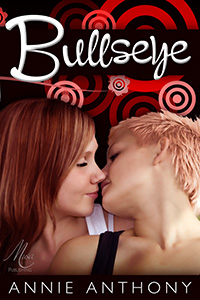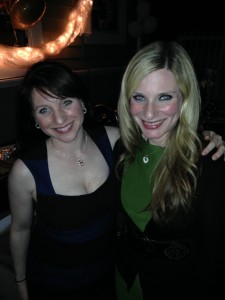In this next installment of the Alumni Interview Series, I caught up with Jeanne De Vita (2000) and talked to her about her time since the MFA, researching books, and some of her current projects.
 1) First and foremost, how did you go about deciding you wanted to become a writer?
1) First and foremost, how did you go about deciding you wanted to become a writer?
I’ve loved writing since I was seven years old. I wrote a short story using our spelling words for a second grade project. The paper was cut into the shape of Santa Claus and the beard was lined so we could also practice penmanship. I brought the Santa home and I remember my mom crying at what I wrote. It was then that I realized the power of putting my ideas out there for people. I was (am) a really shy kid, and writing allowed me to be bold, powerful, and exposed in a way I could not have done verbally. I am a better speaker now and I no longer write on Santa-shaped paper, but since I was seven years old, writing has been a vital form of expression for me.
2) Did you have any mentors along the way who really affected your approach to craft?
Absolutely–several.
One of my undergraduate professors, Christiana Langenberg, at Iowa State University taught me that getting it out of you and onto the paper is the most critical step in the creative process. It sounds basic, but you have to trust yourself and WRITE. Shutting down the internal editor, shutting out the external noise–those are probably two of the biggest obstacles to writing.
William O’Rourke gave me the most painful but powerful feedback of my career. His words have stayed with me daily–truly. I have edited more than 50 books and I find myself hearing William’s comments to me in my own feedback to authors. I’ll summarize it, probably very poorly, but William in effect taught me that you can write the most glorious prose but if your reader can’t follow the story, it’s essentially shite. I’m sure he never said *shite* but he did teach me that my work needs to be timely, original, but yet still consumable. I really hated hearing that a decade ago, but the man knows what he teaches. Writing that is exclusively personal is journal–there is a craft to creating original, publishable work. So speaking to craft, you need to always remember you’re writing for a reader–not just for yourself.
I believe William also tried to teach us the value of trends in publishing. I really bucked at that back when I was in the program. I think I heard him at the time in a very narrow way, and I rejected the notion that true creativity could be externally motivated. Like, oh, vampire books are selling, I’m going to write one. With time and experience in the industry, I see his wisdom played out now every day. If you want to write brilliance and keep it in a drawer, you can ignore all the rules of publishing. But I think what William was trying to teach us is if you want to be a working writer, you need to participate in trends, create trends. Be timely, relevant. Not a follower–followers always fail. (Not another vampire book!) You can write brilliant and beautiful work and it may never see the light of day. And that’s fine if that’s your goal. But if you want to participate in the business of writing, you need to not only write, you need to be a student of the market and society. It’s actually freeing when you look at it a certain way, but back when I was a student, I just didn’t appreciate what William was saying.
So thank you, William, for those invaluable lessons that have been reinforced for me countless times/ways in my work post-ND.
3) What’s your fondest memory of your MFA years at Notre Dame?
I have so many. In fact, I would go back tomorrow if they’d let me do it again! The workshops–the community of my peers and the fun/terror of workshopping. Teaching–I was lucky enough to be allowed to teach in the First Year Writing program while I was in the MFA program. I passionately love teaching and learning how to teach from a place like ND, encountering students like those in the undergrad First Year program–preparing for those classes and teaching them are some of the most formative experiences I have had and are some of my most treasured memories. Again, can I come back? Pretty please?
4) What are you doing for a living now?
I edit, write, and take on contract work to bring in a few extra pennies.
5) What kind of writing projects are you working on now? How are they going?
I live for my writing projects. I spend the majority of my time editing but working on my own writing is like coming home. Since graduating from ND, I’ve come out as a lesbian so most of my work has a GLBTQ theme. Most of my writing will be published under my pen name, Annie Anthony. Since I work for a publisher, I want some separation between me the publisher/editor and me the writer. Right now, I’m working on a book that is under contract called Bullseye. It’s a lesbian novel that has a 3-book series potential. It’s a love story that has cancer, nature, and dogs as central themes. I’m also working on a novel–historical fiction that takes place in a 1920’s Harlem. The research I’ve done for that book–the clothing, the vernacular dialogue, the food. It’s been a true labor of love. I’m working on a fantasy/sci-fi piece that is really under my skin. I’ve also got several pieces of lesbian erotica nearly done. I dabble in poetry and have a couple of poems out to literary journals now. The great thing about being a writer right now is there are so many ways to connect. I use Pinterest as an idea board and it’s public, so my readers or fellow writers can check out the idea board for almost everything that I’m working on. I have a blog for my pen name that I use as a springboard a lot.

And the writing is going really well. I think editing has made me a far better writer. I encourage anyone who wants to seriously publish fiction to get into a group and beta read, edit. If you can, hook up with a working mentor and learn how to critically read. My publishing company focuses primarily on genre fiction but we have a literary imprint. Our acquiring editors and senior staff are all highly educated and experienced. We see genre fiction as conforming to certain norms, but by no means do we sacrifice the quality of the final product. Many indie publishers need unpaid interns–not just undergrads, but all ages–so take on whatever experience you can to learn about craft. Doing that has absolutely helped me write not just that personal chaos that William saw in workshop, but work that I hope brings my stories to readers in a clear and meaningful way.
6) Can you talk a bit about your research process? Do you do research for a lot of your work or just this one? One thing I’ve always wondered about is doing research when you don’t have a humongous library or access to things like JSTOR. How do you manage some of those obstacles?
I am sure it varies for each author, but for me, I like to research in two ways: 1) physically being present in a place if the location is significant and 2) examining what I will call ‘significant sources.’
Being physically present: if I’m writing and a critical location is a diner, it helps to physically go to different diners at different times of day in different cities–small towns, etc. Eat the specials, drink the iced tea, watch the staff clean the tables around you. I think an imaginative person can capture the truth of places in a way that is far bigger than just capturing fact. For me, that is an essential quality in good writing: truth versus fact.
Good writing requires facts and specific details that are also absolutely objectively verifiable and real. The author may wow a reader with emotion and truth, but they will hook the reader with detail.
I always get frustrated when authors submit books to me at the publishing company which clearly convey they have not done their research. Nothing can redeem an invalid story and no story is less valid than one that reveals the author’s inaccuracies or errors.
So back to your question and part two of my answer: significant sources.
In my writing now, I already have the “truth” of the story formed. I would never be inspired to write a piece outside of that essential truth, I don’t think… but to make the story fit into the historical time period where I believe it belongs, I need research. I was not alive in the 1920’s and I need to make sure that what the characters wear, drink, their diction, what products they had and did not have (for example, you might be surprised how late clothing had zippers!!) are all correct.
To obtain this research, I always start with fiction and movies created in and near the time period of my interest. I buy used books from Amazon and from Goodwill stores– I bend and abuse my library card. The internet is a brilliant tool for authors–we can find blogs, pictures, stories on just about any subject. I have used eBay in my research as well. Sometimes just looking for the clothing of a time period can contribute volumes to the research. I also try, when I can, to visit flea markets or antique stores that I think might have items from the time period of my interest. I have found that collectors are generally avid historians and they are generous with their information and time. All research–even anecdotal–has its place–even if all it does is help create the mindspace for me where the work can flow.
Research informs the reality of the book, but does not create its truth. And that is what is so inspiring and amazing about writing in general. Look at The Great Gatsby. The story–the essential truths of that book are absolutely timeless, correct? But the details, the circumstance, the mannerisms, the dress, even the location–are critically placed for Fitzgerald’s truth. Can any author at any time write a timeless, true story and set it in the setting, time, space that is most viable for that author? I think so and that possibility is exhilarating.
And of course, the absolute best research any author can do is to read. Books in the genre, books from the time period, books from the country or place. After all, there is no greater education for a writer than the books themselves, I think.
 7) Do you have any secret for getting writing done out “in the real world”?
7) Do you have any secret for getting writing done out “in the real world”?
Absolutely. Just do it. Honestly, I have written notes on a train, while stopped in traffic. Just get it down on paper. That’s the first step. Editing and revising come later but all the trite inspirational quotes aren’t wrong–the journey of a thousand steps, etc. etc. Day job? Five kids? Sick? It’s OK. Just write a few words. Then a few more. Don’t stop.
Also, practice craft. All those rules do apply if you really want to get published. Show, don’t tell. Research your market. Write an effective synopsis and query letter. Revise, revise, revise. Grammar and punctuation matter. Be polite. Good manners.
Also, this is not a secret, but connecting with people really helps. If you know a published writer, ask about their publisher. If you belong to a critique group, ask about agents. It’s not networking for networking’s sake but being part of a community can help get your work to the right publisher. And with our current publishing models, authors who don’t self-promote might never make a dime. So connecting with readers can be a critical part of a new author’s success.
8) Is there one piece of advice you wish you had heard when you were starting out?
Yes. As much as I had certain positive feedback and encouragement, I wish someone had told me to NEVER EVER give up. To NEVER lose faith and to keep writing and studying craft. The publishing market is so vast and the need for good work is so huge. When I first submitted my work to a publisher, I was absolutely terrified of rejection. Of embarrassment. Of not being good enough. Well, guess what? I was good enough. We all are—there is room for all of us at this table. If I had believed in myself more profoundly a decade ago, I might have had a different career. I have no regrets, this was my path, but anyone who really wants to publish and write just has to find his/her voice, perfect the craft, and then find that right niche.
Cheers,
Dev